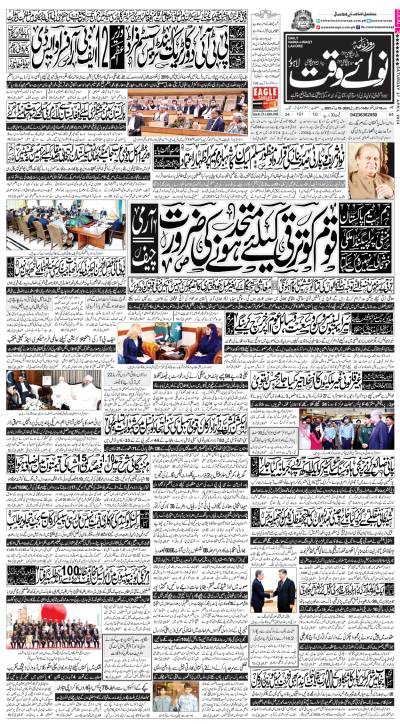Islamabad - Dr Asad Hafeez, dean and executive director of Health Services Academy (HSA), has said that UNCRC calls for ensuring every child has access to the basic right of survival which includes exclusive breastfeeding during first six months of child’s birth.
Celebrating the 25th anniversary of the UN Convention for the Rights of the Child (UNCRC) and International Day for Prevention of Child Abuse, the HAS in collaboration with Save the Children Pakistan held a full day workshop with students and faculty members of Health Services Academy.
Inaugurating the seminar, Dr Asad said that exclusive breastfeeding and adequate complementary feeding are key interventions for improving child survival. He said exclusive breastfeeding is one of the most low cost interventions for reducing child mortality.
Dr Saima Hameed, Registrar HSA, discussed the micronutrient deficiencies in Pakistan. She highlighted how the rate of exclusive breastfeeding since the last Pakistan Demographic Health Survey five years ago has shown 0.6 per cent increase; whereas the rate of bottle feeding has gone up. Although Pakistan voted for the International Code of Marketing Breast-milk Substitutes (the Code) in 1981, a national law on the subject was passed in 2002. Following devolution, it is up to the provinces to invest in the subject. Dr Saima thanked Save the Children for highlighting the importance of breastfeeding and the violations against the Code in its report.
Dr Asma Badar, MNCH specialist Save the Children, presented the overall situation of breastfeeding in Pakistan and reasons for poor exclusive breastfeeding rates. Pakistan has the highest bottle-feeding rates and lowest exclusive breastfeeding rates in South Asia. According to the Demographic Health Survey, the percentage of exclusively breast-fed children has risen only from 37.1 per cent in 2006-07 to 37.7 per cent in 2012-13. However, bottle-feeding rates have risen from an already undesirable 32.1 per cent in 2006-07 to 41 per cent in 2012-13.
Dr Shahzad Ali Khan, assistant professor HSA, presented the findings of Save the Children’s report on the breastfeeding and violations of the Code in Pakistan by substitute milk producers. He shared that 22% of newborn deaths can be prevented if breastfeeding is initiated within the first hour of birth; and 16% of newborn deaths can be prevented if initiated within the first 24 hours of birth. Currently in Pakistan, the public health agenda needs to focus around MNCH issues. Provincial governments need to undertake interventions, and adopt and implement provincial laws and rules on breastfeeding in line with the Code.
Rubina Bhatti, project coordinator TheNetwork for Consumer Protection, said that the vigilant monitoring and implementation of breastfeeding laws is necessary to avoid unnecessary promotion of infant formula milk. She shared the findings of a labeling compliance report by TheNetwork which evaluated violations of the Pakistan Protection of Breastfeeding and Child Nutrition Rules 2009 by breast milk substitute companies in Pakistan on their products, and in advertisements and promotional material.
The civil society can play an effective role in creating awareness about the importance of breastfeeding and advocacy for implementation of its laws.
Participants and students at the Health Services Academy asked questions on the importance of separating exclusive breastfeeding from predominant breastfeeding rates to identify factors that contribute towards child mortality. They asked about what actions were taken by the national Infant Feeding Board as a follow up to the findings of this labeling compliance report by TheNetwork which revealed that due to devolution soon after 2010, no action could be taken by the national Infant Feeding Board against violating breast milk substitute companies. Adding to Dr Shahzad’s presentation, participants mentioned the important role fathers can play and acknowledged the need to advocate within families to promote exclusive breastfeeding, and good Infant and Young Child Feeding practices.
Saturday, April 27, 2024
‘Breastfeeding key to cut child mortality rate’
UN warns of 'alarming reports' of escalation in North Darfur
8:26 AM | April 27, 2024
All set for 5-day polio vaccination campaign
April 27, 2024
Three killed by lightning strike in Mansehra
April 27, 2024
Seven tubewells of WSSP converted to solar power
April 27, 2024
Political Tightropes
April 27, 2024
Wave of Revolution
April 27, 2024
Brave Peacekeepers
April 27, 2024
Economic Challenges
April 26, 2024
No Compromise
April 26, 2024
Korangi’s challenge
April 27, 2024
US double standard
April 27, 2024
Political turmoil
April 27, 2024
Photon power
April 26, 2024
Justice prevails
April 26, 2024
ePaper - Nawaiwaqt
Advertisement
Nawaiwaqt Group | Copyright © 2024





